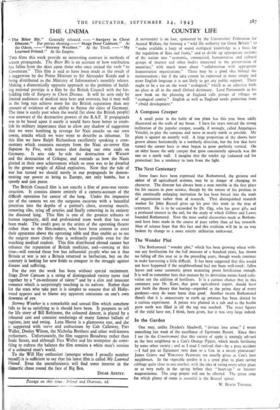COUNTRY LIFE
A MOVEMENT is on foot, sponsored by the Universities' Federation for Animal Welfare, for forming a "wild life authority for Great Britain" to " make available a body of sound ecological knowledge as a basis for the regulation of flora and fauria," and to divide up appropriate sections of the nation into " economic, commercial, humanitarian and cultural groups of interest and other bodies interested in the preservation of amenities," with much more about " collaboration with appropriate humanitarian. organisations." There may be a good idea behind the memorandum ; but if the idea cannot be expressed in more simple and more Fnglish language it is not likely to get any public support. There ought to be a tax on the word "ecological," which as an adjective finds no place at all in the small Oxford dictionary. Lord Portsmouth in his new book on the planning of England calls groups of villages an "ecological comity." English as well as England needs protection from " ribald development."
A Compass Creeper A small point in the habit of one plant has this year been oddly illustrated on the.walls of my house. I have for years noticed the strong inclination of the popular creeper, usually, if wrongly, called Ampelopsis Veitchii, to play the compasi and move as nearly north as possible. My plant is against an easterly wall. A large proportion of the shoots have grown almost horizontally in a northerly direction, but the few that have turned the corner have at once begun to grow perfectly vertical. On an older house the only creeper that grew consistently upwards was the one on a north wall. I imagine that the tender tip (coloured red for protection) has a tendency to turn from the light.
The Next Centenary Some fears have been expressed that Rothamsted, the greatest and oldest of all agricultural stations, may be in danger of changing its character. The director has always been a man notable in the first place for his success in pure science, though by the nature of his position in this continually enlarging institution he has been forced into the work of organisation rather than of research. That distinguished research worker Sir John Russell gives up his post this week in the year of centenary. He is to be succeeded by Dr. Ogg, who has great gifts and a profound interest in the soil, for the study of which Gilbert and Lawes founded Rothamsted. Now the most useful discoveries made at Rotham- sted have been made in the course of pure rather than ad hoc research. Men of science hope that this fact and this tradition will be in no way broken by change to a more strictly utilitarian endeavour.
The Wonder Plot
The Rothamsted " wonder plot," which has been growing wheat with- out any fertilisation for the full measure of a hundred years, has shown no falling off this year or in the preceding years, though weeds continue to make harvesting a little difficult. It has been suggested that this would not have happened if the neighbourhood had not been well-treed: fallen leaves and some automatic green manuring prove fertilisation enough. It is well to remember here that manure by its derivation means hand culti- vation not the addition of fertilisers. It is a curious chance that in this centenary year Dr. Keen, that great agricultural expert, should have put forth the theory that hoeing—regarded as the prime duty of every gardener—may do more harm than good. Another recent Rothamsted theory that it is unnecessary to earth up potatoes has been denied by a curious experiment. A potato was planted in a tub and as the haulm grew earth was filled in till the top was reached. The exact figures of the yield have riot, I think, been given, but it was very large indeed.
In the Garden One may, unlike Dryden's Shadwell, " deviate into sense." I wrote something last week of the excellence of Egremont Russet. Since then I see (in the Countryman) that this variety of apple is strongly advised as the best neighbour to a Cox's Orange Pippin, which needs fertilising by some other variety ; and as I read I realised that—by a pure accident —I had put an Egremont next door to a Cox in a recent plantation! James Grieve and Worcester Pearrnain are usually given as Cox's best neighbours. In the vegetable garden it is a good plan to plant spring cabbage quite close to one another, with the idea of eating every other plant or so very early in the spring before they " heart-up " or becomt- magnanimous. The crop proper will not be affected. The green crop for which plenty of room is essential is the Brussel sprout.
- W. BEACH THOMAS.


























 Previous page
Previous page